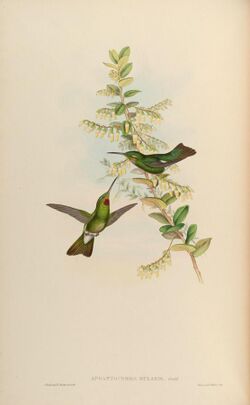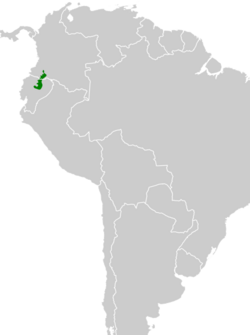Biology:Pink-throated brilliant
| Pink-throated brilliant | |
|---|---|

| |
| Scientific classification | |
| Domain: | Eukaryota |
| Kingdom: | Animalia |
| Phylum: | Chordata |
| Class: | Aves |
| Clade: | Strisores |
| Order: | Apodiformes |
| Family: | Trochilidae |
| Genus: | Heliodoxa |
| Species: | H. gularis
|
| Binomial name | |
| Heliodoxa gularis (Gould, 1860)
| |

| |
The pink-throated brilliant (Heliodoxa gularis) is a species of hummingbird in the "brilliants", tribe Heliantheini in subfamily Lesbiinae. It is found in Colombia, Ecuador, and Peru.[3][4]
Taxonomy and systematics
The pink-throated brilliant was at times treated as the sole member of genus Agapetornis and then Agapeta. In the mid 20th century Agapeta was merged into the present genus Heliodoxa.[5] The species is monotypic.[3]
Description
The pink-throated brilliant is about 11 to 12 cm (4.3 to 4.7 in) long. The sexes are essentially identical. Both have the eponymous glittering pinkish red throat patch, though the female's is smaller. They have an almost straight black bill, a white spot behind the eye, and shining green upperparts with an iridescent green stripe in the middle of the forehead. The breast is shining green, the belly gray, and the undertail coverts whitish. The tail is long, forked, and bronzy green.[6]
Distribution and habitat
The pink-throated brilliant is mostly found from the southern end of Colombia's Eastern Andes into Ecuador as far as Sucumbíos and Napo provinces. There are also a few records in northeastern Peru. It inhabits humid montane forest at elevations between 250 and 1,050 m (820 and 3,400 ft).[6]
Behavior
Movement
The pink-throated brilliant is believed to be sedentary.[6]
Feeding
The pink-throated brilliant has been documented feeding at the flowers of Psittacanthus and other members of family Loranthaceae. It also feeds on insects.[6]
Breeding
Almost nothing is known about the pink-throated brilliant's breeding phenology.[6]
Vocalization
What is thought to be the pink-throated brilliant's song is "a repeated nasal 'keuw'...also given as a single note in flight and while feeding."[6]
Status
The IUCN assesses the pink-throated brilliant as least concern. Its forest habitat continues to be cleared for agriculture, ranching, mining, and logging.[1] It does occur in a few protected areas in Colombia but none in Ecuador.[6]
References
- ↑ 1.0 1.1 BirdLife International (2022). "Pink-throated Brilliant Heliodoxa gularis". IUCN Red List of Threatened Species 2022: e.T22687721A210310352. https://www.iucnredlist.org/species/22687721/210310352. Retrieved 23 July 2022.
- ↑ "Appendices | CITES". https://cites.org/eng/app/appendices.php.
- ↑ 3.0 3.1 "Hummingbirds". January 2022. https://www.worldbirdnames.org/new/bow/hummingbirds/.
- ↑ HBW and BirdLife International (2020) Handbook of the Birds of the World and BirdLife International digital checklist of the birds of the world Version 5. Available at: http://datazone.birdlife.org/userfiles/file/Species/Taxonomy/HBW-BirdLife_Checklist_v5_Dec20.zip [.xls zipped 1 MB] retrieved 27 May 2021
- ↑ Remsen, J. V., Jr., J. I. Areta, E. Bonaccorso, S. Claramunt, A. Jaramillo, D. F. Lane, J. F. Pacheco, M. B. Robbins, F. G. Stiles, and K. J. Zimmer. Version 31 January 2022. A classification of the bird species of South America. American Ornithological Society. https://www.museum.lsu.edu/~Remsen/SACCBaseline.htm retrieved February 1, 2022
- ↑ 6.0 6.1 6.2 6.3 6.4 6.5 6.6 Züchner, T., C. J. Sharpe, and P. F. D. Boesman (2020). Pink-throated Brilliant (Heliodoxa gularis), version 1.0. In Birds of the World (J. del Hoyo, A. Elliott, J. Sargatal, D. A. Christie, and E. de Juana, Editors). Cornell Lab of Ornithology, Ithaca, NY, USA. https://doi.org/10.2173/bow.pitbri1.01 retrieved 6 May 2022
Wikidata ☰ Q1261802 entry
 |


